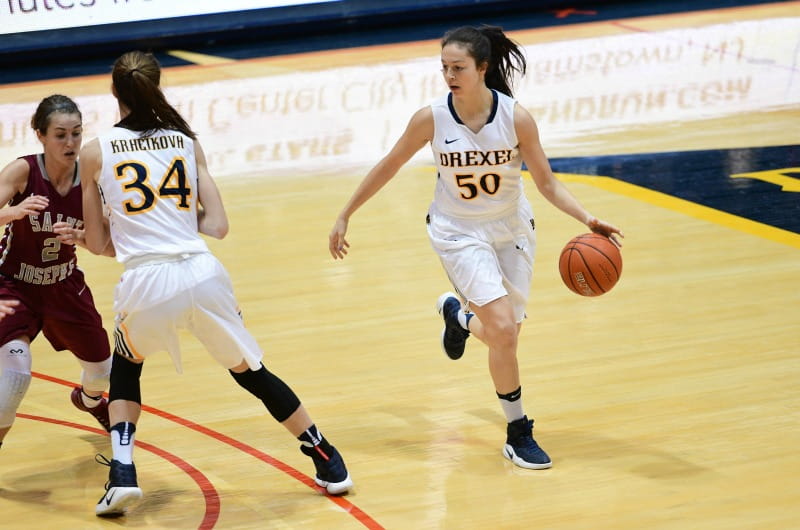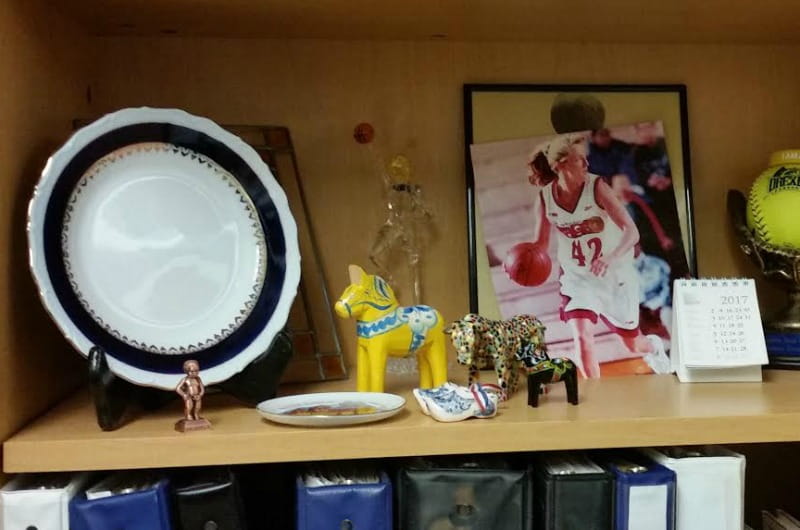How Drexel Women’s Basketball Developed an International Roster
 By Ben Seal
By Ben Seal

- Alumnus and Olympic Gold Medalist Justin Best to Address Graduates at Drexel’s University-wide Commencement Ceremony
- Celebration of Scholarship Event Highlights Transformative Impact on Students
- An Incredible First Year as an Eagles Cheerleader and a Two-Time Drexel Graduate
- Flying From the Eagles to the Saints

Drexel freshman Ana Ferariu dribbles while sophomore Tereza Kracikova sets a screen.
When Denise Dillon took over as head coach of the Drexel women’s basketball team 14 years ago, she had another team on her mind. Looking at Old Dominion University and its 17 straight Colonial Athletic Association championships, she saw a program she wanted to emulate. She also saw that Old Dominion was finding success with international players at a time when most college rosters were still heavy on American players.
With the help of associate head coach Amy Mallon, who leads the team’s international recruitment efforts, Dillon has built a program bolstered by a steady stream of student-athletes from overseas. The trio currently on the roster — Ana Ferariu, a freshman from Romania; Tereza Kracikova, a sophomore from the Czech Republic; and Eline Maesschalck, a redshirt sophomore from Belgium — are the latest class of foreign players on a team that has had multiple international members in each of the past 12 seasons.
“When Denise hired me, we knew that would be a niche for us — an area to grow and get some players in here right from the very beginning who could help us do well and progress the way we wanted to as a program,” said Mallon.
With the help of its international talent, the team has done just that. Since Dillon took over, Drexel has recruited players from Spain, Canada, Sweden, Romania, Slovakia, Belgium, Lithuania, England, the Ivory Coast and the Czech Republic — 13 in all.
This year’s squad, at 20-9, is wrapping up its ninth winning season in its last 10 and has its sights set on bringing home its first CAA championship since 2009 at this week’s conference tournament. Ferariu, in just 12 minutes a night, is the team’s fifth-leading scorer at 5.3 points per game and its second-best three-point shooter at 43 percent. Kracikova is averaging 3 points in 10 minutes per game.
More important than their contributions on the court, though, is what they and previous international players bring to the team’s culture, according to Dillon.

“Professionally, we thought it would enhance our program, and it certainly has,” said Dillon. “But personally, you’re looking to enhance your life as well, and I think it has done exactly that.”
Mallon played professionally in Luxembourg, which opened the door to her future in international recruiting. She now goes to Europe each summer to watch tournaments and scout potential future Dragons. She often visits international recruits at home in the fall to continue the conversation about coming to Drexel.
The process has gotten a boost in recent years from former players who have begun to serve as unofficial recruiters in their own right. Ferariu is on the team in large part because Gabriela Marginean, a 2010 graduate with the most points in the women’s program’s history and a fellow Romanian, brought her to the coaching staff’s attention.
“We wouldn’t have Ana if it wasn’t for Gabi. We wouldn’t have Eline if it wasn’t for [Jasmina Rosseel ‘11, a fellow Belgian who played with the Dragons from 2007-11],” said Dillon. “Our players recruit for us because of the experience that they have here, and nothing makes us prouder than knowing they want their teammates or someone from their country to be a part of what they were a part of.”
Ferariu said she trusted Marginean’s advice. Despite being so far from home and adapting to a new culture, she said coming to Drexel was the right decision. The transition has been easier because of her international teammates and the staff’s experience welcoming foreign student-athletes, she said.
“When you put everything together, you share this experience of what everybody knows about life and their backgrounds,” said Ferariu. “When you come here and have other international students, you feel more comfortable than if you were by yourself.”
The comfort translates to the court. Drexel’s motion-heavy, perimeter-focused offense is an ideal fit for the increased versatility often shown by European players, Dillon and Mallon said. Guards and forwards alike are taught to shoot, pass and handle the ball, and those fundamentals fit right into the team’s system. And, as Mallon noted, international players don’t have to wait long to get into the action — they’re expected to play right away. It’s a recipe for success that has established Drexel as a home for international student-athletes.
“They’re winning, they’re successful both on and off the court, and they enjoy doing it,” said Mallon. “They’re having fun along the way.”
The Dragons face Northeastern University this Thursday at 7:30 p.m. in the quarterfinal round of the CAA tournament in Harrisonburg, Virginia. The semifinals will be played Friday and the final is set for Saturday at 7 p.m.
In This Article
Drexel News is produced by
University Marketing and Communications.